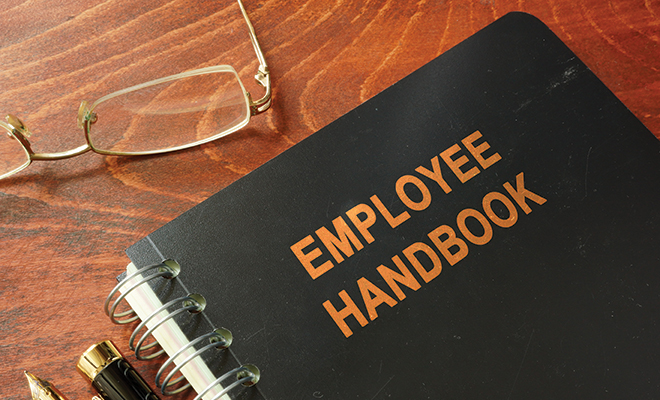
Is Your Employee Handbook Up to Date?
The employee handbook is one of your company’s most useful and practical tools. But is it up to date with the changes taking place in the workplace?
Experts agree that your handbook should be updated every year, along with your company’s underlying policies and procedures. Local, state and federal laws change rapidly and so does technology. Securing legal counsel will ensure your handbook offers protection for both your company and its employees.
Of course, a handbook won’t cover you completely, but if your employees are aware of your policies and know that you review them every year, it’s easier to resolve problems. Be sure to redistribute copies of the handbook to your employees and require their signatures acknowledging the updates.
According to the Society for Human Resource Management, laws on leave, overtime and social media are changing quickly and require annual revision. Social media and data privacy rank at the top of necessary updates, since so many people work from their personal phones and tablets. But they also conduct personal business and play with social media such as Facebook and Messenger. Your handbook should be clear that employees will retain no right to privacy while accessing social media at work or on company-owned equipment. For example, if your employee is found playing Solitaire on a work desktop for hours on end, it will make termination easier. Not clicking on links, downloading apps or disclosing proprietary information about your company should be clear also.
Next in importance are reasonable accommodations for your employees. Under certain circumstances, such as physical health conditions, religious beliefs, pregnancy and childbirth, among others, employees are entitled to reasonable accommodations. Be certain your handbook spells out exactly what accommodations are, how they should be requested, when and by whom. You need to explain the legal bases for accommodations and your company’s intent to comply.
Recently, the most common charge brought by the U.S. Equal Employment Opportunity Commission has been retaliation. Since the process needs to be fair for both the person making the claim of retaliation and the person who is accused, your handbook should state that your company can’t promise confidentiality, but that identities will be revealed only when necessary.
Wages and payroll are the two pay-related issues that cause problems for companies. To minimize liability, be clear on overtime and pay deductions. Federal laws regulate overtime pay for salaried and hourly workers, so you should put it in writing that your employees may not work overtime without prior permission, and if they do it anyway, they may be disciplined. The handbook should also explain pay practices in detail, and your company’s intention to correct mistakes with regard to pay.
Leave benefits are becoming more generous, especially since large companies such as Microsoft and Amazon are expanding their parental leave policies. Some offer pay with jury duty, domestic violence leave and blood donation leave. The consensus is that these add-ons promote your employee’s quality of life, boost morale and serve as positive worker retention and recruitment tools.
Attendance proves to be murky for some employers. Be careful to emphasize in writing who may qualify for the Family and Medical Leave Act and the Americans with Disabilities Act. In some cases, an employee may qualify for an accommodation under both acts.
Yet another area to emphasize is smoking, including the use of e-cigarettes and medical or recreational marijuana. E-cigarettes should be included in your handbook, just like other tobacco products and where, when and how they are permitted, or not. Marijuana can generally be treated as other drugs in your handbook, but state laws are changing rapidly. For example, if your company is located in Arizona, you cannot fire an employee for a positive marijuana test if that person has a valid medical marijuana card.
Finally, in 2015, the U.S. Supreme Court held that states must recognize same-sex marriage. The ruling requires a company to extend the same health and retirement benefits to all married couples, regardless of their gender identification. Your handbook should clarify this. The lesbian, gay, bisexual and transgender, or LGBT, employee is now protected within the Civil Rights Act, so it’s a good idea to add a general statement to your handbook that you do not discriminate at all.
The Department of Labor, states, municipalities and court decisions constantly change and influence employment laws, and your company is responsible for staying informed and updating your handbook. Nevertheless, distributing a new handbook annually is appropriate.
Nothing contained in your employee handbook will prevent problems in the workplace, but it’s a necessary tool to minimize the risks. Final advice: always consult an attorney with experience in this area. ■
Sources: infinitihr.com, hrmorning.com, sba.gov and shrm.org.







